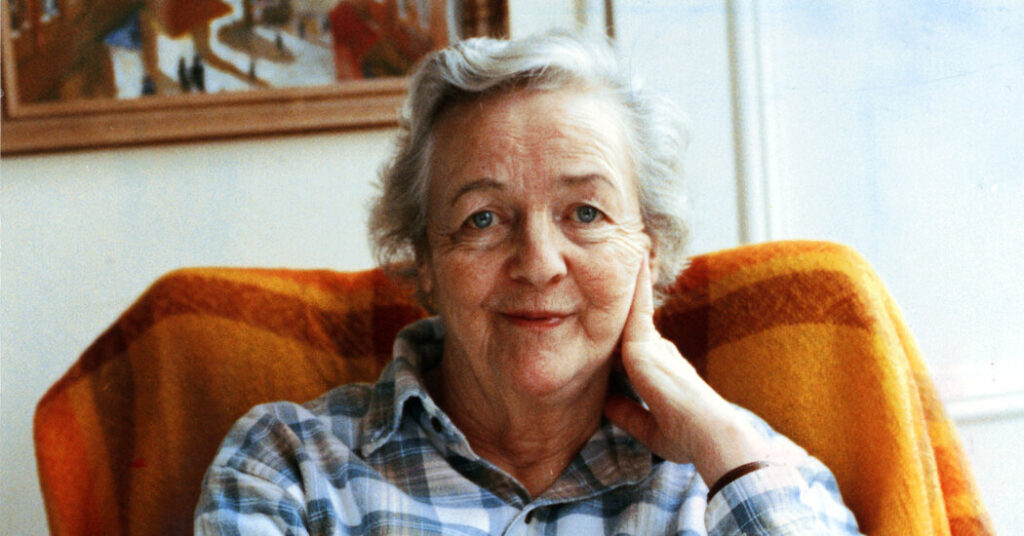TROUBLEMAKER: The Fierce, Unruly Life of Jessica Mitford, by Carla Kaplan
Among many other remarkable qualities, Jessica Mitford was a poster girl for collaboration: the creative kind, not the Nazi-nuzzling so notoriously practiced by her sister Unity.
Working on her first memoir, “Hons and Rebels” (1960), about her escape from an eccentric, aristocratic upbringing in the Cotswolds, Mitford shared pages hot from the typewriter with a committee of intimates to see if she could set off what she called a “Roarometer” — make ’em laugh.
“Writing is said to be a lonely task,” she later wrote, as quoted in “Troublemaker,” Carla Kaplan’s doggedly researched and resolutely modern new biography. “I did not find it so.”
Mitford — known as Decca, a childhood nickname — was left-wing activist first and muckraking journalist second, both pursuits aerated by a sense of mischief. Her most successful book, a scathing 1963 exposé of the funeral industry’s pretensions titled “The American Way of Death,” was written with her second husband, Bob Treuhaft, a lawyer and fellow radical “who did not have to grab the microphone” and let her swankier byline prevail at their publisher’s insistence.
Yet Decca the person has not often been scrutinized in the singular. Since the last of the six Mitford sisters, Deborah “Debo” Cavendish, the Dowager Duchess of Devonshire, died in 2014, they have lingered in the cultural imagination mostly as a posh blob, featured in a TV series and graphic novel, or as connective tissue in other people’s life stories.
A collection of Decca’s letters — she left behind over 12,000 after her own death at 78 in 1996 — was reviewed admiringly in The New York Times, but a 2010 biography, “Irrepressible,” by Leslie Brody, escaped notice here. Kaplan, an American literature professor who earlier edited Zora Neale Hurston’s correspondence, acknowledgesBrody’s book, but positions her own as a template for would-be allies in social justice movements that have intensified since.
Also, she writes, for “anyone who would seek a do-over that goes in unanticipated, improbable directions.” I mean — yes, yes, please.
Mitford redirected more often than Ms. Pac-Man, becoming an unlikely doyenne of Oakland, Calif., after stops in London, Miami (“a horrible, tinselly town with its maddening eternal sunshine,” she wrote) and Washington, D.C. She clapped on a fancy hat when summoned by HUAC and cosplayed a Southern lady in green chiffon and pearls to attend the besieged rally of Freedom Riders led by Martin Luther King, Jr. in Montgomery, Ala. One of her dottiest third acts — “Saturday Night Live” could not make this up — involved singing duets with her dear friend Maya Angelou and leading a kazoo band called Decca and the Dectones. “Pivots were her superpower,” Kaplan writes.
Her subject opened a “running-away account” with Drummonds Bank at age 11 and then did exactly that with Esmond Romilly, a second cousin who was nephew of Winston Churchill, eight years later. She joined the antifascist brigade in Spain, firing into a tree while wearing a brown corduroy ski suit charged to her father, a.k.a “Farve.” (When Unity had carved swastikas in the nursery window with a diamond ring, Decca retorted with hammers and sickles.) Together they wrote columns, stole toothpaste and adopted the American slang phrase “punch-packing” to explain their “willful refusal of all obstacles.”
Romilly and Mitford’s first daughter, Julia, succumbed to measles as a baby, and he was fatally shot down at 23 during an air raid over the North Sea, leaving his widow to raise their second daughter, Constancia, a.k.a. Dinky, after the Democratic Party donkey.
Mitford’s first son with Treuhaft, Nicholas, died after a bicycle accident at 14; his overly formal interment may have planted a seed for “The American Way.” Their second son, Benjamin had what she called “a screw loose” and was eventually diagnosed with bipolar disorder. The devoted spouse and helpmeet eventually revealed a longtime affair with a family friend.
Her own greatest passions being more political than personal, Mitford soldiered on; her mentor Virginia Foster Durr, the civil rights lobbyist, accused her of having a “concrete upper lip.”
Mitford had been denied formal schooling — Farve believed it thickened girls’ ankles — and why she was so troubled by the village poverty the other Mitfords took as a fact of life remains a mystery of personality. So fervent was her commitment to racial justice and prison reform, Kaplan reports, that after being assaulted, possibly raped, by a Black assailant in Berkeley after walking home from a Civil Rights Congress meeting, she refused to file a police report for fear of how he’d be treated.
Her guiding principle was work, work, work, which does not always make for dramatic reading. But “Troublemaker” is a repository of astounding resourcefulness; a detailed curriculum vitae; a crack against the soft rump of the modern screen-addled slacker.
Before taking to the typewriter like the other best-selling Mitford, Nancy (“Love in a Cold Climate”), Decca toiled behind the till in dress shops and drugstores; at the World’s Fair; for the Royal Air Force; and — formatively for her reporting — as an investigator for the Office of Price Administration.
She organized and volunteered and demonstrated and petitioned. Balancing an indoorsy distaste for nature with, Kaplan writes, “the gift of complete indifference to domestic chaos,” she was fond of labor-saving appliances. She was squeamish about feminism. Perhaps her own intense experience of sisterhood prevented her from abstracting the term to all womankind.
“Troublemaker” refuses to reduce this most beautifully messy and complicated of Mitfords to bon mots, but her contributions to the language echo on past its rich footnotes.
“On speakers” meant one had broken the silent treatment. “Abyssinia” was better than au revoir. And we can thank Mitford for etching into the lexicon that perfect, enduring portmanteau: “frenemy.”
TROUBLEMAKER: The Fierce, Unruly Life of Jessica Mitford | By Carla Kaplan | Harper | 592 pp. | $32
Alexandra Jacobs is a Times book critic and occasional features writer. She joined The Times in 2010.
The post Reintroducing Jessica Mitford, the Activist With a ‘Concrete Upper Lip’ appeared first on New York Times.




